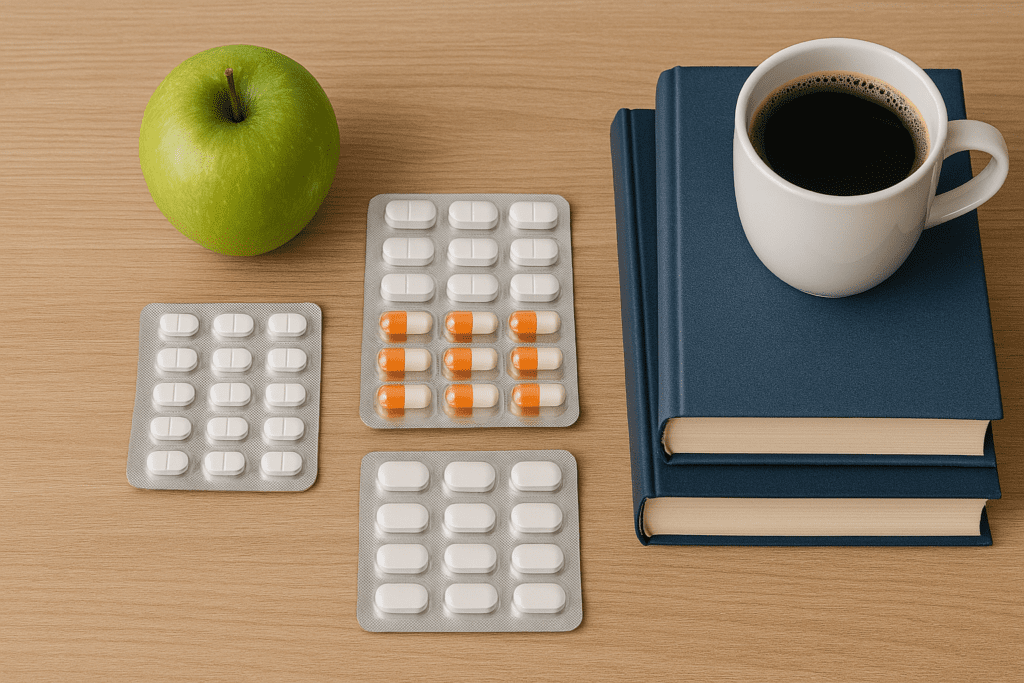In a world driven by performance and productivity, many people find themselves struggling to maintain the energy and motivation necessary to meet daily demands. Whether it’s due to mental fatigue, a lack of concentration, or underlying medical conditions such as ADHD, depression, or chronic fatigue syndrome, the search for effective solutions often leads individuals to consider prescription medication for energy and motivation. While lifestyle interventions like sleep hygiene, nutrition, and exercise play essential roles in mental wellness, they may not be enough for everyone. For those requiring additional support, modern medicine offers several options that can enhance focus, boost energy, and improve overall motivation. But what does science actually say about these treatments, and how do they work?
You may also like: Best Natural Supplements and Vitamins to Improve Focus Backed by Science and Expert Insight
Understanding the Neurological Basis of Energy and Motivation
To appreciate how prescription medications help increase energy and motivation, it’s important to first understand the brain mechanisms behind these cognitive functions. Dopamine, norepinephrine, and serotonin are key neurotransmitters that influence mood, focus, and drive. Dopamine, in particular, plays a central role in the brain’s reward system and is closely linked to feelings of pleasure, attention, and goal-directed behavior. When dopamine levels are too low, individuals may experience symptoms such as fatigue, apathy, or lack of interest in activities—hallmarks of depression or attention-deficit disorders.
Prescription medications that target these neurotransmitters can effectively modulate brain chemistry, helping to restore balance and improve mental performance. Drugs that help you focus often work by enhancing dopamine and norepinephrine activity, which increases alertness and facilitates sustained attention. These medications are not a replacement for healthy habits, but when used appropriately, they can be a powerful adjunct for individuals who need additional cognitive support.
Stimulant Medications: Proven Efficacy in Treating ADHD and Fatigue
Stimulants are among the most commonly prescribed drugs for boosting energy and motivation, particularly in the treatment of attention-deficit/hyperactivity disorder (ADHD). Medications such as Adderall (amphetamine and dextroamphetamine) and Ritalin (methylphenidate) are well-known for their ability to enhance focus, reduce impulsivity, and increase motivation. They work by increasing the availability of dopamine and norepinephrine in the brain, thereby improving cognitive efficiency and wakefulness.
Numerous studies have validated the effectiveness of stimulant medications for focus and concentration. Research indicates that individuals with ADHD experience significant improvements in academic performance, work productivity, and quality of life when treated with stimulants. Interestingly, stimulants have also shown efficacy in treating other conditions characterized by low energy and motivation, such as narcolepsy and certain forms of treatment-resistant depression.
However, stimulants are not without risks. They carry the potential for misuse and dependency, particularly when used without medical supervision. Side effects can include elevated heart rate, anxiety, insomnia, and appetite suppression. As a result, healthcare providers typically evaluate each patient’s medical history, mental health status, and lifestyle factors before prescribing these medications.
Non-Stimulant Alternatives for Energy and Focus
While stimulants are often effective, not everyone is a suitable candidate for these medications. Individuals with certain cardiovascular conditions, anxiety disorders, or a history of substance use may require non-stimulant options. Fortunately, science has identified several non-stimulant medications that help support energy and motivation.
Atomoxetine (Strattera), for example, is a selective norepinephrine reuptake inhibitor (NRI) approved for the treatment of ADHD. Unlike stimulants, it does not increase dopamine levels significantly, which reduces its potential for abuse. Although its onset of action is slower, atomoxetine offers a viable alternative for individuals seeking sustained focus without stimulant-related side effects.
Another non-stimulant option is bupropion (Wellbutrin), an atypical antidepressant that affects both dopamine and norepinephrine. Bupropion has been found to improve motivation and concentration, particularly in patients experiencing depression-related fatigue. In some cases, it is prescribed off-label to address cognitive symptoms even in individuals without major depressive disorder. Its dual action on neurotransmitters makes it one of the more versatile prescription medications for energy and motivation.
Modafinil and Armodafinil: Wakefulness Agents with Cognitive Benefits
Modafinil (Provigil) and its longer-acting counterpart armodafinil (Nuvigil) are classified as wakefulness-promoting agents. Originally developed to treat narcolepsy and other sleep disorders, these medications have gained attention for their off-label use in enhancing cognitive performance. Unlike traditional stimulants, modafinil has a lower risk of abuse and appears to produce fewer side effects related to jitteriness or crash.
Clinical trials have demonstrated that modafinil improves attention, executive functioning, and working memory in both sleep-deprived and well-rested individuals. It is thought to work by increasing levels of dopamine in the brain, although its exact mechanism remains partially understood. Some researchers also believe it may influence histamine and orexin systems, which regulate wakefulness.
Given its relatively mild side effect profile, modafinil is sometimes considered when other medications for focus and concentration are not well-tolerated. However, it still requires a prescription and careful monitoring, particularly in individuals with heart conditions or a history of mental health concerns. For those wondering what drug gives you energy and motivation without the typical stimulant side effects, modafinil may offer a compelling alternative.

Antidepressants and Motivation: Treating the Root Cause of Fatigue
In many cases, persistent low energy and lack of motivation are not isolated symptoms but rather signs of an underlying mood disorder such as depression. In these situations, treating the root cause can significantly improve cognitive and physical vitality. Selective serotonin reuptake inhibitors (SSRIs) like fluoxetine (Prozac) or sertraline (Zoloft) are commonly prescribed to alleviate depressive symptoms, including fatigue and anhedonia.
While SSRIs primarily affect serotonin levels, some individuals may benefit more from antidepressants that also influence dopamine and norepinephrine. These include serotonin-norepinephrine reuptake inhibitors (SNRIs) like venlafaxine (Effexor) or duloxetine (Cymbalta), which can provide additional support for those struggling with both mood and energy issues. In certain cases, psychiatrists may recommend combination therapy or augmentation strategies involving medications like bupropion to target multiple pathways simultaneously.
It is crucial to note that antidepressants typically take several weeks to reach full efficacy. Patients may need to trial different formulations under medical supervision to identify the most effective medication for their unique neurochemistry. During this process, ongoing communication with a healthcare provider is essential to adjust dosages, manage side effects, and ensure that progress is being made.
The Role of Medical Supervision and Individualized Treatment Plans
No two brains are exactly alike, and as such, the quest for the best prescription medication for energy and motivation is highly individualized. Factors such as genetics, medical history, mental health status, and even daily routines can influence how a person responds to medication. This is why medical supervision is not just recommended—it is essential.
A qualified healthcare provider will conduct a thorough evaluation to determine the most appropriate treatment strategy. This may involve cognitive assessments, lab tests, and a detailed history of symptoms and lifestyle habits. In some cases, the most effective approach may combine medication with psychotherapy, cognitive behavioral therapy (CBT), or coaching strategies aimed at building executive function and goal-directed behaviors.
Additionally, doctors are well-equipped to monitor for potential side effects, drug interactions, and signs of dependency. This kind of vigilant oversight is especially important when dealing with drugs that help you focus or those with energizing effects, as misuse can lead to physical or psychological harm. Patients are encouraged to maintain regular follow-up appointments and to report any new or worsening symptoms promptly.
Realistic Expectations and Ethical Considerations
While modern pharmacology offers powerful tools for enhancing energy and motivation, it is important to maintain realistic expectations. Prescription medications are not miracle cures, nor do they offer instant transformation. They can, however, serve as valuable tools within a broader framework of health optimization that includes proper sleep, nutrition, stress management, and personal development.
There are also ethical considerations to keep in mind, particularly when medications are used off-label or by individuals without a clinical diagnosis. The line between treatment and enhancement can become blurred, raising questions about fairness, access, and long-term health effects. For example, the use of ADHD medications by healthy individuals to gain academic or professional advantages has sparked considerable debate in the medical and ethical communities.
Ultimately, the goal should be to restore and support natural cognitive function, not to exceed human limitations at any cost. In this sense, medication for focus and concentration should be viewed as part of a comprehensive approach to well-being, rather than a standalone solution. Open dialogue with healthcare professionals, combined with a commitment to self-awareness and responsible use, is key to achieving optimal outcomes.
What to Consider Before Starting Medication
Before embarking on any pharmacological treatment for energy and motivation, individuals should take the time to educate themselves and consult with professionals. Understanding the risks, benefits, and potential side effects of various medications is a critical first step. It is also important to consider whether the lack of energy or motivation is situational, behavioral, or the result of an underlying health condition that requires medical intervention.
Lifestyle modifications should always be explored first. For many people, improving sleep hygiene, managing stress, incorporating physical activity, and practicing mindfulness can lead to significant improvements in focus and motivation. However, when these strategies fall short or when symptoms are significantly impairing daily life, prescription medications may offer the support needed to regain a sense of vitality and purpose.

Frequently Asked Questions (FAQ): Prescription Medication for Energy and Motivation
Can prescription medication for energy and motivation help individuals who don’t have ADHD or depression?
Yes, in certain cases, prescription medication for energy and motivation may be considered even in the absence of a formal diagnosis like ADHD or depression, but only under close medical supervision. There are instances where individuals experience significant cognitive fatigue or motivational deficits due to high-stress occupations, post-viral syndromes, or burnout—conditions that may not meet clinical criteria for a disorder but still impair daily function. In these cases, a physician may consider off-label use of medication that helps you focus, especially if traditional interventions like rest, therapy, and nutrition fail to provide relief. However, using these drugs without proper evaluation can be risky, and the decision should be grounded in ethical, legal, and health-related considerations. What drug gives you energy and motivation in these scenarios must be determined carefully to avoid misuse or unintended effects.
How do doctors decide which medication for focus and concentration is appropriate for each individual?
Doctors take a highly personalized approach when selecting medication for focus and concentration. They evaluate multiple variables, including a patient’s mental health history, physical health status, co-occurring conditions, and even lifestyle and occupational needs. Neurocognitive testing, mood assessments, and sleep evaluations may be used to gain deeper insight into the root causes of fatigue or distractibility. Some patients may respond well to stimulant-based drugs that help you focus, while others might benefit from non-stimulant alternatives like bupropion or modafinil. The key is balancing efficacy with safety while tailoring the choice of prescription medication for energy and motivation to the individual’s neurochemical profile and life context.
Are there any long-term risks associated with using medication that helps you focus?
Yes, long-term use of medication that helps you focus can come with risks, particularly if the treatment is not regularly reviewed or medically supervised. Stimulant medications, for example, may lead to tolerance, dependency, or cardiovascular strain over time. Non-stimulants and wakefulness agents are generally safer for long-term use, but they are not without side effects such as sleep disturbances, weight changes, or emotional blunting in some individuals. It’s essential to evaluate both the physical and psychological impacts of prolonged use and to consider regular medication breaks or reassessments. Responsible, medically guided use of prescription medication for energy and motivation can mitigate many of these risks, especially when paired with healthy lifestyle practices.
What role do genetics play in how someone responds to focus-enhancing medications?
Genetics significantly influence how individuals metabolize and respond to drugs that help you focus. Variants in genes related to dopamine transport, liver enzymes (like CYP2D6), and even serotonin receptors can affect how efficiently a drug works and what side effects may arise. Pharmacogenetic testing is becoming more accessible and can help doctors personalize treatment plans by predicting which medications are more likely to be effective or poorly tolerated. For example, someone with slower metabolism of stimulants might experience heightened side effects, whereas another person might require higher doses to see a benefit. As the science of personalized medicine evolves, the future of prescription medication for energy and motivation will likely include more routine use of genetic data to guide therapy.
Can medication for focus and concentration be combined with nootropics or supplements?
Combining prescription medication for energy and motivation with nootropics or supplements can sometimes enhance effectiveness, but it must be approached cautiously. Some supplements, like L-theanine or Rhodiola rosea, may support mental stamina without interfering with medications. Others, however, such as high-dose caffeine or unregulated herbal products, may amplify side effects or cause dangerous interactions. Before adding any supplement, it is crucial to consult with a healthcare provider to ensure compatibility with the prescribed medication that helps you focus. Well-informed integration of supportive compounds can sometimes increase resilience, but only when managed with precision and evidence-based oversight.
How do social and environmental factors influence the effectiveness of prescription medications for motivation?
Social and environmental conditions can dramatically shape how effective a prescription medication for energy and motivation will be. Living in a high-stress environment, working long hours, or dealing with unstable housing or financial stress can undermine the benefits of even the most effective medication. Similarly, lack of sleep, poor diet, or unsupportive relationships can reduce the positive impact of drugs that help you focus. Addressing contextual issues through therapy, social support, or lifestyle changes enhances the likelihood that the medication will work optimally. In many cases, medication serves as a catalyst for change, but sustainable improvements often depend on modifying the broader environment as well.
Are there gender differences in response to medication that helps you focus?
Yes, gender can influence how individuals experience and respond to medication that helps you focus. Hormonal fluctuations, especially those related to estrogen and progesterone, can affect how the body processes certain drugs. For instance, some women report changes in medication effectiveness depending on their menstrual cycle, while men may metabolize stimulants at different rates. There’s also emerging research suggesting that gender-related differences in dopamine receptor density may play a role in how prescription medication for energy and motivation works. These variations highlight the importance of gender-sensitive approaches in prescribing and monitoring treatment for focus and motivation.
What are some emerging or experimental treatments that may outperform current drugs that help you focus?
Recent innovations in neuropharmacology suggest that future options for medication that helps you focus may involve novel mechanisms of action. Drugs targeting trace amine-associated receptors (TAARs), glutamate pathways, or orexin systems are under investigation for their potential to enhance cognitive function without the traditional side effects of stimulants. Additionally, researchers are exploring digital therapeutics—app-based or VR-driven interventions that, when combined with prescription medication for energy and motivation, could boost efficacy. Psychedelic compounds in microdoses, such as LSD and psilocybin, are also being studied for their potential to improve focus and creativity, although much more research is needed. These emerging therapies could expand the range of what drug gives you energy and motivation in the next decade.
How should someone evaluate whether their current medication for focus and concentration is still working?
To assess whether a medication for focus and concentration is still effective, individuals should monitor key indicators such as task completion rates, mental clarity, energy levels, and emotional well-being. It’s important to differentiate between therapeutic plateaus—where benefits stabilize—and diminishing returns, which may signal tolerance or changing neurobiology. Keeping a daily journal can help track subtle shifts in motivation, focus, and side effects. If symptoms begin to return or new issues arise, this could suggest that a dosage adjustment or medication change is needed. Regular check-ins with a prescribing provider ensure that prescription medication for energy and motivation remains aligned with evolving needs and goals.
What are some non-pharmacological strategies that complement medication that helps you focus?
A number of non-pharmacological strategies can enhance the effects of medication that helps you focus, often yielding greater long-term results. Structured time-blocking, task prioritization, and the use of digital focus tools (like Pomodoro timers or distraction blockers) can reinforce attentional stamina. Additionally, engaging in aerobic exercise has been shown to improve dopamine function and enhance the effects of drugs that help you focus. Practices such as mindfulness meditation and cognitive-behavioral strategies also build resilience and support motivation regulation. When used alongside prescription medication for energy and motivation, these techniques create a multifaceted approach that promotes sustained performance and well-being.

Conclusion: Finding the Right Balance with Medication for Energy and Motivation
Choosing the best prescription medication for energy and motivation is a deeply personal journey that should be guided by scientific evidence, medical expertise, and a clear understanding of one’s own needs. Whether you’re considering stimulant-based treatments, non-stimulant alternatives, or antidepressants that address the root cause of low energy, it’s essential to work closely with a healthcare provider who can offer tailored guidance and support.
Prescription medication for energy and motivation can be transformative when used judiciously, but it is not a one-size-fits-all solution. Drugs that help you focus may differ in their mechanisms, efficacy, and safety profiles, which makes individualized treatment plans so critical. Understanding what drug gives you energy and motivation involves not just reading about pharmacological effects, but also engaging in honest conversations about lifestyle, mental health, and long-term goals.
In the end, medication that helps you focus is most effective when paired with a holistic approach to health. From the neurochemical intricacies of dopamine regulation to the emotional landscape of motivation and drive, these treatments represent a sophisticated intersection of science and human experience. When chosen wisely and monitored carefully, medication for focus and concentration can empower individuals to reclaim their mental clarity, reignite their ambition, and thrive in every facet of life.
mental fatigue solutions, brain fog remedies, cognitive enhancers, energy-boosting treatments, focus improvement strategies, attention support medication, motivation and productivity, executive function support, fatigue and depression link, cognitive behavioral therapy for focus, non-stimulant brain boosters, prescription focus enhancers, low energy treatment options, dopamine and motivation, neurochemical balance, mental clarity support, wakefulness-promoting therapies, alternative ADHD treatments, personalized mental health care, science-backed motivation strategies
Further Reading:
Nootropics (“Smart Drugs” or “Cognitive Enhancers”)
Focus pills: Supplements to boost focus and memory
Caffeine: Cognitive and Physical Performance Enhancer or Psychoactive Drug?
Disclaimer
The information contained in this article is provided for general informational purposes only and is not intended to serve as medical, legal, or professional advice. While Health11News strives to present accurate, up-to-date, and reliable content, no warranty or guarantee, expressed or implied, is made regarding the completeness, accuracy, or adequacy of the information provided. Readers are strongly advised to seek the guidance of a qualified healthcare provider or other relevant professionals before acting on any information contained in this article. Health11News, its authors, editors, and contributors expressly disclaim any liability for any damages, losses, or consequences arising directly or indirectly from the use, interpretation, or reliance on any information presented herein. The views and opinions expressed in this article are those of the author(s) and do not necessarily reflect the official policies or positions of Health11News.


